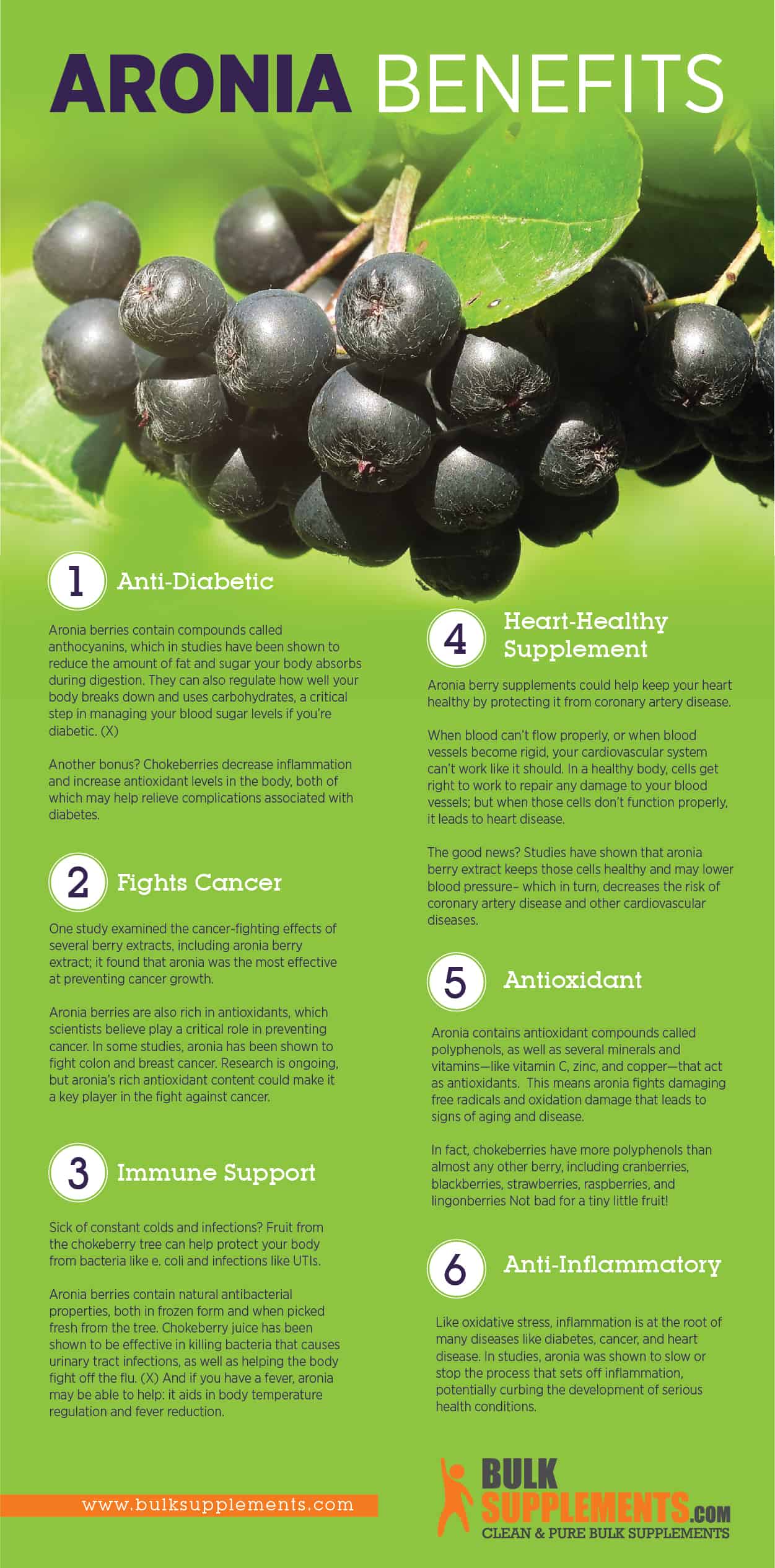Aronia Berry: Benefits, Dosage & Side Effects
by James Denlinger Digital Marketing StrategistWhat is Aronia Berry?
The term, “superfood” may be an overused buzzword, but in this case, aronia berries fit the bill. They may be small, but they pack a mighty health punch.
Aronia, also known as Aronia melanocarpa or black chokeberry, is a small berry native to North America. Similar in appearance to blueberries, aronia berries are rich in important nutrients, vitamins, and minerals. They contain antioxidant, anti-inflammatory, and anti-bacterial properties, and have also shown positive and healing effects on everything from cancer to the flu, diabetes, and heart disease.
Read on to find out why you should add aronia to your supplement routine.
Aronia Benefits
Anti-Diabetic
Aronia berries contain compounds called anthocyanins, which can decrease the level of fat and sugar the body absorbs during digestion. They also regulate how well the body breaks down and uses carbohydrates, which, for diabetics, is a critical step in the management of blood sugar.
Another bonus? Chokeberries decrease inflammation and increase antioxidant levels in the body, both of which may help relieve complications associated with diabetes.
Heart-Healthy Supplement
Aronia berry supplements could help keep your heart healthy by protecting it from coronary artery disease.
When blood can’t flow properly, or when blood vessels become rigid, your cardiovascular system can’t work like it should. In a healthy body, cells get right to work to repair any damage to your blood vessels; but when those cells don’t function properly, it leads to heart disease.
The good news? Studies have shown that aronia berry extract keeps those cells healthy and may lower blood pressure– which in turn decreases the risk of coronary artery disease and other cardiovascular diseases.
Fights Cancer
One study examined the cancer-fighting effects of several berry extracts, including aronia berry extract; it found that aronia was the most effective at preventing cancer growth.
Aronia berries are also rich in antioxidants, which scientists believe play a critical role in preventing cancer. In some studies, aronia has been shown to fight colon and breast cancer. Research is ongoing, but aronia’s rich antioxidant content could make it a key player in the fight against cancer.
Antioxidant
Aronia contains polyphenols, as well as several minerals and vitamins – like vitamin C, zinc, and copper. Aronia fights damaging free radicals and oxidation damage that lead to early signs of aging and disease.
Chokeberries have more polyphenols than almost any other berry, including cranberries, blackberries, strawberries, raspberries, and lingonberries. Not bad for a tiny little fruit!
Anti-Inflammatory
Like oxidative stress, inflammation is at the root of many diseases like diabetes, cancer, and heart disease. In studies, aronia slowed or stopped the process that sets off inflammation, potentially curbing the development of serious health conditions.
Immune Support
Sick of constant colds and infections? Fruit from the chokeberry tree can help protect your body from bacteria like e. coli and infections like UTIs.
Whether frozen or picked from the tree, aronia berries contain natural antibacterial properties. Chokeberry juice has been shown to be effective in killing bacteria that causes urinary tract infections, as well as helping the body fight off the flu. And if you have a fever, aronia may be able to help: it aids in body temperature regulation and fever reduction.
 PIN IT
PIN ITWhat’s the Best Kind of Aronia?
Commercially-grown black chokeberries are larger and sweeter, unlike those found in the wild, which offer a rather bitter, earthy, and tannic accidity. If you opt to grow aronia berries yourself, the ideal harvest time is in the fall, since the warmth of the summer enhances its natural flavor.
To cut their bitter taste, try mixing chokeberries into juices, pies and breads, wines, jellies and jams, and syrups.
Try the berries, or infuse with water to make a soothing aronia berry tea. The deep, vibrant, purple color makes them a natural food colorant.
If you opt to take aronia supplements, there are a few different options available. Aronia berry extract contains compounds extracted from the berry itself for maximum health benefits. Companies sell it in capsule form or as aronia berry powder, which you can mix into the beverage of your choice for a tart, refreshing pick-me-up.
Aronia Side Effects and Dosage
Since the berry itself is very sour and bitter, it may be easier to get your daily dose of aronia berry in the form of a pill, tablet, extract or powder.
Research on the benefits continues, but there are no life-threatening or toxic side effects associated with aronia supplements. Excessive consumption, however, may cause nausea, stomach upset, or vomiting. If you are pregnant or nursing, talk to your doctor before taking aronia supplements. If you are taking any prescription medications, ask your doctor if it’s safe for you to take aronia berry supplements to avoid any potential drug interactions.
As a dietary supplement, take 1000 mg 1-2 times daily, or as recommended by your physician.
The Bottom Line
Strawberries, blueberries and raspberries may be more popular options, but, to sum it up, the aronia berry’s anti-inflammatory, anti-bacterial, and heart-healthy compounds benefit overall health.
Sponsor Ads
Created on Apr 17th 2020 13:18. Viewed 346 times.




